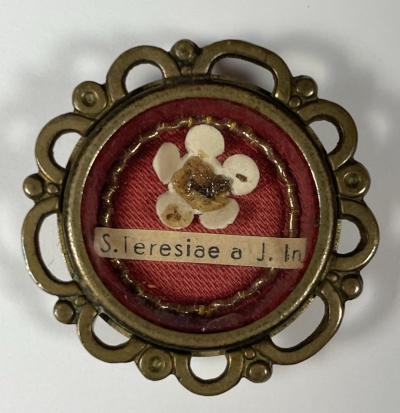Saint Therese de Lisieux († 1897), popularly known as "The Little Flower of Jesus," was a Roman Catholic French Discalced Carmelite nun widely venerated in modern times. After nine years as a Carmelite religious, having fulfilled various offices, and having spent her last eighteen months in Carmel in a night of faith, she died of tuberculosis at the age of 24. Thérèse has been a highly influential model of sanctity for Catholics and for others because of the "simplicity and practicality of her approach to the spiritual life". Together with Saint Francis of Assisi, she is one of the most popular saints in the church's history. Pope Pius X called her "the greatest saint of modern times." She is a holy patron of Gardens of Vatican City, Missionaries; France; Russia; HIV/AIDS sufferers; radio care-a-thons; florists and gardeners; loss of parents; tuberculosis; and the Russicum; Alaska. Therese was beatified in 1923 and canonized on 17 May 1925 by Pope Pius XI, only 28 years after her death. Her feast day is commemorated on 1 October.
Round yellow-metal glass-fronted reliquary theca housing the first-class bodily relic of Saint Therese de Lisieux. The relic is affixed to a silk ground surrounded by silver wire ornamentation and identified in Latin on a typeset cedula label as S. Theresiae a J. In. (St. Therese of Child Jesus). On the back, under a protective cap, the theca is secured with a seal of red Spanish wax bearing an imprint of a coat of arms of the Postulator General of the Order of the Discalced Carmelites of the Blessed Virgin Mary of Mount Carmel.
Additional Info
- ID#: 33-RSMIS-14
- Size: 33 mm in diameter
- Age: ca. 1950's
- Origin: Rome, Italy
- Materials: metal, glass, silk, paper, Spanish wax
- Price: SOLD!
Additional Images of this Item
https://russianstore.com/en/online-store/catholic-reliquaries/item/3045-reliquary-theca-with-relics-of-carmelite-st-therese-of-lisieux-of-child-jesus#sigProId719041d0ad
Online Store & Services
Information
Quick Link
Information
Quick Link
SAVE 5% from your first purchase when you subscribe to receive our infrequent mailings with updates on new arrivals, exclusive offers, and fascinating stories on relevant subjects.








 Поменять язык на русский
Поменять язык на русский 